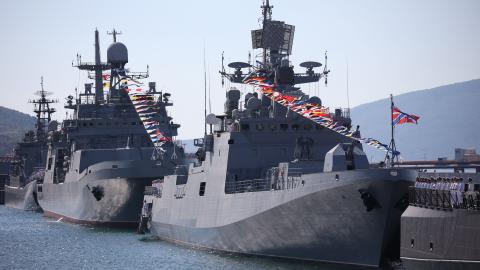Ukrainian President Volodymyr Zelensky told the annual Crimean Platform Summit last week: “The Russian military fleet can no longer operate in the western part of the Black Sea and is fleeing from Crimea. This is a historic achievement.” He was correct.
Much of the international focus in Russia’s invasion of Ukraine has been on the brutal fighting taking place on land. This is to be expected: thousands of videos showing tanks and armored vehicles being destroyed are available for the world to see online. At times, both sides are firing more artillery shells in one week than some European countries produce in one year, and drones drop bombs on troops hiding in trench systems reminiscent of the First World War.
One area overlooked, therefore, is the fight for control of the Black Sea. While Ukraine’s counteroffensive on land is making slower progress than many had hoped, Kyiv’s actions at sea are having significant success.
This is interesting because Ukraine barely has a navy to speak of. Of the few ships it had, most were destroyed by Russia in the early days of the invasion in February 2022. However, the absence of its own fleet has been compensated for by creativity, ingenuity and determination, enabling Ukraine to deliver significant blows to the Russian Navy.
There is publicly available evidence that Ukraine has damaged or destroyed at least 16 Russian vessels since the war began. This includes the Moskva, the flag ship of Russia’s Black Sea Fleet, which was sunk in April 2022 with a creative combination of Turkish-made Bayraktar TB2 drones and Ukrainian-produced Neptune anti-ship cruise missiles.
Last month, Ukraine used British-supplied air-launched cruise missiles to destroy a Russian attack submarine undergoing repairs in a drydock in occupied Crimea. This vessel was worth an estimated $300 million, but is now a heap of scrap metal. It was the first time a Russian submarine had been lost in combat since the Second World War. In the same strike, the Ukrainians also destroyed a Ropucha-class landing ship. A month before, the Ukrainians severely damaged another Ropucha-class landing ship with a maritime drone packing 450 kilograms of explosive. These strikes significantly reduced Russia’s ability to perform an amphibious landing against Ukraine’s largest port city, Odesa.
Ukraine’s ability to hit naval targets has had an impact on where the Russian Navy can freely operate in the Black Sea. Commercially available satellite imagery shows that most of the Russian Navy has relocated from its bases in Crimea to a smaller base in Novorossiysk on the Russian mainland. This port is primarily for civilian use and is not equipped to handle so many warships. Consequently, the de facto leader of Abkhazia, a region of Georgia along the Black Sea that has been under Russian occupation since 2008, said recently that a new Russian naval base will be built there. Even if this does happen, construction will take years.
Ukraine’s actions on the Black Sea have also allowed important grain shipments to Africa and Asia to continue. Before the invasion, Ukraine was one of the largest agriculture exporters in the world. When the war began, the future of its agricultural exports was in doubt. Last year a Turkish-led diplomatic effort brokered the Black Sea Grain Initiative between Russia and Ukraine. In July, Moscow withdrew from the deal, gain throwing the safety and security of Ukrainian grain exports in doubt. After a short pause, however, Ukraine resumed grain shipments. Clearly, this would not have been possible without Ukraine’s success against the Russian Navy.
The Battle for the Black Sea has been a reminder of two important geopolitical realities in the region. First, the Crimean Peninsula remains the most strategic piece of territory in the Black Sea. Recognized internationally as part of Ukraine but annexed and under Russian control since 2014, it was originally thought by Moscow to be a safe distance away from Ukrainian strikes. The peninsula has been used as a springboard for Russia’s attacks against the rest of Ukraine. If Russia maintains a military presence in Crimea, Ukraine will never be fully safe. This is why any end to the conflict, whether militarily or diplomatically, must result in Crimea being returned to Ukraine.
Secondly, Türkiye has an irreplaceable role in the region. For hundreds of years, Türkiye has been in competition with Russia over influence and control in the Black Sea. The 1936 Montreux convention granted Türkiye sovereignty over the straits that connect the Black Sea to the Mediterranean. When the Ukraine war began, Türkiye used the authority granted to it in the convention to prevent Russian warships from entering the Black Sea. This has stopped Russia from reinforcing its Black Sea Fleet with additional ships. Türkiye has also played an important role in developing Ukraine’s naval capabilities. Currently, two warships for Ukraine are being manufactured in Türkiye. While Ankara has strived to maintain a delicate balance between Ukraine and Russia in this war, Ankara knows that a weaker Russia in the Black Sea is better for Türkiye.
When Russia first invaded, few could have imagined that it would lose so many warships against a country effectively without a navy. Ukraine’s success was made possible by technological advancements that the Russians were not expecting. Even some of Ukraine’s partners were skeptical of some if its new concepts, such as the development of maritime drones or the ability to produce affordable anti-ship missiles.
The lessons learned from Ukraine’s experience in the Black Sea can be applied to other regions in the world, such as the Gulf, the Caspian Sea, or the South China Sea. There is no doubt that policymakers in these regions are taking note.
Ukraine is changing the future of naval warfare. Because of this, it is winning the battle of the Black Sea.















